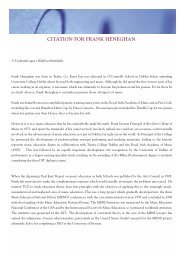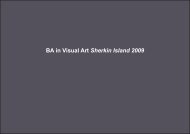TWICE THE SIZE - DIT Update - Dublin Institute of Technology
TWICE THE SIZE - DIT Update - Dublin Institute of Technology
TWICE THE SIZE - DIT Update - Dublin Institute of Technology
Create successful ePaper yourself
Turn your PDF publications into a flip-book with our unique Google optimized e-Paper software.
On the basis <strong>of</strong> the survey, Inglehart and Welzel developed a map that demonstrates the<br />
position <strong>of</strong> various countries in relation to the two values dimensions: traditional/secular-<br />
rational and survival/self-expression (Fig. 7). Ireland’s position on the Inglehart-Welzel map<br />
shows a quite unique combination <strong>of</strong> fairly strong traditional values with well developed self-<br />
expression values. While Ireland scores on the survival/self-expression axis similarly to other<br />
European countries, its position on the traditional/secular-rational axis is closer to the countries<br />
<strong>of</strong> Latin America and South Asia.<br />
+<br />
Secular-Rational Values<br />
_<br />
1.00<br />
0.95<br />
CHOICE<br />
0.90<br />
0.85<br />
0.80<br />
+<br />
0.75<br />
0.70<br />
0.65<br />
0.60<br />
0.55<br />
0.50<br />
0.45<br />
0.40<br />
0.35<br />
0.30<br />
0.25 _<br />
0.20<br />
0.15<br />
0.10<br />
0.05 CONSTRAINT<br />
0.00<br />
0.00 0.05 0.10 0.15 0.20 0.25 0.30 0.35 0.40 0.45 0.50 0.55 0.60 0.65 0.70 0.75 0.80 0.85 0.90 0.95 1.00<br />
_<br />
Self-Expression Values<br />
Figure 8: The Two-Dimensional Value Space in Theory (Welzel, 2006).<br />
Inglehart and Baker’s (2000) analysis <strong>of</strong> the World Values Survey found that there is a massive<br />
cultural change taking place, but at the same time distinctive traditional values persist.<br />
Economic development is associated with pervasive, and somewhat predictable, cultural<br />
changes. In almost all industrial societies the direction has shifted from traditional towards<br />
secular-rational values. The rise <strong>of</strong> post-industrial societies brings a shift towards values <strong>of</strong><br />
trust, tolerance, well—being and post-materialist, self-expression values. Conversely, economic<br />
collapse tends to push societies in the opposite direction. Inglehart and Baker’s (op cit) analysis<br />
shows that values do change, but they still reflect society’s cultural heritage, and the influence<br />
<strong>of</strong> the traditional values system is unlikely to disappear.<br />
Although, on a short-term basis, values change back and forth, the long-term direction <strong>of</strong> the<br />
shift in values is apparent. Human development moves away from the emphasis on constraint,<br />
represented by a combination <strong>of</strong> weak secular-rational values and weak self-expression values,<br />
to an emphasis on choice, which is represented by strong secular-rational and strong selfexpression<br />
values (Fig. 8). Value change moving from constraint to choice is a fundamental<br />
57<br />
+








